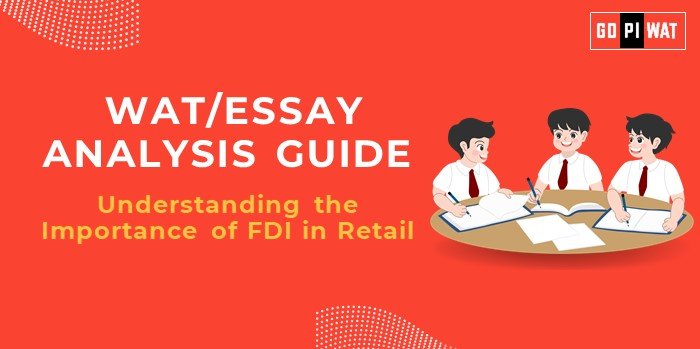📋 WAT/Essay Analysis Guide: Understanding the Importance of FDI in Retail
FDI in India’s retail sector is pivotal, with far-reaching impacts on employment, infrastructure, and consumer options. However, concerns over the survival of traditional businesses and job displacement remain central to the debate, making this a critical topic for B-school analysis.
✨ Effective Planning and Writing
- Time Allocation:
- 🕒 Planning: 5 minutes
- 📝 Writing: 20 minutes
- 🔍 Review: 5 minutes
- Preparation Tips: Outline key statistics on market growth, employment, and stakeholder roles. Be ready to discuss the balance between foreign benefits and local business impacts.
💡 Introduction Techniques for Essays
- Contrast Approach: “While FDI offers a pathway for modernizing India’s retail sector, it poses significant risks to traditional businesses that employ millions.”
- Solution-Based Approach: “FDI can be beneficial if combined with regulations that support local businesses, ensuring a balanced retail ecosystem.”
- Timeline Approach: “Since liberalizing FDI policies in 2012, India has navigated a complex path of attracting foreign capital while preserving its retail diversity.”
📊 Structuring the Essay Body
- Achievements: FDI’s role in capital inflow, supply chain efficiency, and enhanced consumer experiences.
- Challenges with Comparative Analysis: Discuss risks to small retailers and employment, referencing cases like Walmart’s entry into India.
- Future Outlook: Explore recommendations for balanced policies, partnerships, and inclusion of local suppliers to harmonize FDI benefits.
🏁 Concluding Effectively
- Balanced Conclusion: “FDI presents substantial opportunities for retail growth but must be tempered with policies that protect India’s traditional retailers and jobs.”
- Global Comparison Conclusion: “India’s approach to FDI in retail can draw on examples from Brazil and China, seeking both growth and inclusivity.”
📈 Analyzing Successes and Shortcomings
- Key Achievements: Capital investment, consumer diversity, infrastructure improvements.
- Ongoing Challenges: Threats to small retailers, job displacement risks.
- Global Context: Comparative insights from other emerging economies, highlighting the need for balanced regulatory frameworks.
🛠️ Recommendations for Sustainable Progress
- Public-Private Partnerships: Foster collaborations between foreign and local businesses, boosting local supplier integration.
- Policy Adjustments: Introduce caps and incentives to safeguard small retailers.
- Skill Development Initiatives: Develop training programs to help traditional businesses adapt to modern retail practices.
📝 Sample Short Essays
- Balanced Perspective: “FDI in retail offers India a path to economic growth and consumer diversity. However, success will depend on policies that protect local businesses alongside foreign investment.”
- Solution-Oriented: “While FDI poses risks to traditional businesses, balanced regulations can ensure that foreign investments contribute positively to India’s retail ecosystem.”
- Global Comparison: “FDI has transformed retail sectors in countries like China. India can adopt similar strategies while preserving its unique small-business ecosystem.”


